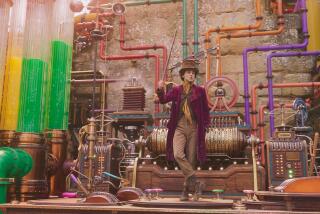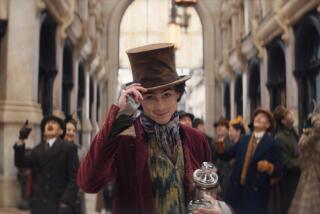A âCharlieâ thatâs not sugar-coated
When it comes to confections, Tim Burton has confessed, his preference is âdark, bitter chocolate.â Which is not exactly a surprise. The directorâs visionary, phantasmagorical version of âCharlie and the Chocolate Factoryâ is equally dark and, if not exactly bitter, unapologetically, relentlessly strange. Burtonâs gifts ensure you wonât be able to take your eyes off the screen, but that doesnât necessarily mean youâll be happy with what youâre seeing.
Though it is much closer to the plot of Roald Dahlâs celebrated book than the 1971 Gene Wilder-starring âWilly Wonka & the Chocolate Factory,â âCharlieâ paradoxically comes off as more Burton than Dahl. Itâs got, in an odd way, the feeling of the filmmakerâs spiritual autobiography rather than the sensibility of the original story.
In theory, this Burton-Dahl teaming, with the added bonus of Burtonâs gifted soul mate Johnny Depp in the Wilder role, sounded as unassailable as Laurel and Hardy. The director, whose resume includes âEd Woodâ and âEdward Scissorhandsâ and whose creepy PG-13 âBatman Returnsâ left parents pleading for mercy, seemed the ideal match for a writer whom one critic described as having âa taste for cruelty, rudeness to adults and the comic grotesque.â
Although Dahl is all that and more, the reason his irresistible 1964 novel has sold 13 million copies in 32 languages is that, grotesqueries aside, its overall tone is completely genial, even affable. This ability to mix opposites, to be welcoming as well as weird, is Dahlâs gift as a writer, an ability that is simply outside Burtonâs sensibility.
âCharlie and the Chocolate Factory,â interestingly enough, appears to know this. Great pains are taken with elements of the filmâs casting, and very particular changes are made to the bookâs plot by screenwriter John August. Itâs all done with an eye to warming up what is otherwise a distant piece of work, as chilly and reserved as the novelâs story of five fortunate children who get to hang out with âthe greatest inventor of chocolates that there has ever beenâ is cheerfully accessible.
All this is really a shame because Burton, working with production designer Alex McDowell and cinematographer Philippe Rousselot, displays a breathtaking visual imagination. Each image in the film -- including references to â2001,â âPsychoâ and the choreography of Busby Berkeley -- is presented with remarkable precision, polished and buffed to the highest of sheens.
But from its opening images, which include chocolate-making machinery that brings instruments of torture to mind and factory chimneys more sinister than even Dickens imagined, âCharlieâ canât help but go to the dark side. With the great horror actor Christopher Lee (whose autobiography is titled âTall, Dark and Gruesomeâ) in a key supporting role, this is a film that can make even chocolate seem inescapably evil.
Which is why itâs such a good thing that young Freddie Highmore, Deppâs winning costar in âFinding Neverland,â is cast as young Charlie Bucket, âthe luckiest boy in the entire world.â Highmore is the most winning young actor imaginable, and his ability to dominate the early parts of the film makes us miss him all the more when his role lessens.
Though Charlie is poor as the dickens, he is lucky because he lives with both his parents (Helena Bonham Carter and Noah Taylor) and all four of his grandparents, including grizzled Grandpa Joe (âWaking Ned Devineâsâ David Kelly), who worked for Willy Wonka once upon a time. That was before rampant industrial sabotage caused the man to close his plant and then reopen it at full capacity without employing a single human soul.
Suddenly, in a news flash that literally startles the world (itâs that kind of a story), Willy Wonka announces the contest to end all contests: The five lucky young people who find a golden ticket inside their Wonka chocolate bars will get to tour that super-secret factory and be eligible to win âthe most something something of any something thatâs ever been.â
Naturally, Charlie finds one of the tickets (there wouldnât be much of a film if he didnât), as do four other children, each of whom represents a type of adolescent evil that Dahl, who had five children of his own, wanted to discourage in the most serious way. They are compulsive consumer Augustus Gloop, whose hobby is eating; snotty rich kid Veruca Salt, as spoiled as the day is long; competitive Violet Beauregarde, who considers herself the No. 1 gum chewer in the world; and video fiend Mike Teavee, whose original passion for television has turned into one for video games.
Once these kids gather at the factory, Charlie perforce fades into the background and the film becomes the property of Deppâs Willy Wonka, a creature of hollow and unnatural glee who is odd even by the standards of previous Depp-Burton collaborations.
A fussy grotesque who makes Wilderâs eccentric candy maker look as cozy as Mister Rogers, Deppâs Willy gives off vibes as varied as Carol Channing and Michael Jackson.
This former (as we learn) weird kid who grew up into a weird genius plays like Burtonâs version of himself, someone so peculiar he exists outside the movie in his own particular corner of space and time.
Deppâs bizarre nature makes the wonders of the factory (including more than 200,000 gallons of chocolate-style liquid), not to mention the punishments meted out to those evil children, seem especially sinister. That tone even infects the 100-plus miniature Oompa-Loompas (all played by Deep Roy) who run the factory and sing and dance to Dahlâs original lyrics put to Danny Elfman music. Anyone looking for a reprise of âCandy Manâ has come to the wrong movie.
As mentioned, âCharlie and the Chocolate Factoryâ works overtime to attempt to balance its darker nature by changing the book. Charlie offers to sell the lucky ticket to help pay for food for the family, and, at the filmâs climax, he places family values front and center in a way that feels especially forced. Roald Dahl never resorted to stratagems like that. But then again, he didnât need to.
*
âCharlie and the Chocolate Factoryâ
MPAA rating: PG for âquirky situations, action and mild languageâ
Times guidelines: Misbehaving children suffer gruesome consequences
Released by Warner Bros. Pictures. Director Tim Burton. Producers Richard D. Zanuck, Brad Grey. Screenplay John August, based on the book by Roald Dahl. Cinematographer Philippe Rousselot. Editor Chris Lebenzon. Costumes Gabriella Pescucci. Music Danny Elfman. Production design Alex McDowell. Supervising art director Leslie Tomkins. Set decorator Peter Young. Running time: 2 hours.
In general release.
More to Read
Only good movies
Get the Indie Focus newsletter, Mark Olsen's weekly guide to the world of cinema.
You may occasionally receive promotional content from the Los Angeles Times.











